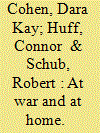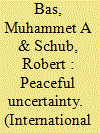|
|
|
Sort Order |
|
|
|
Items / Page
|
|
|
|
|
|
|
| Srl | Item |
| 1 |
ID:
178205


|
|
|
|
|
| Summary/Abstract |
What are the consequences of women dying in combat? We study how women fighting on the frontlines of the military affects public attitudes toward (1) military conflict and (2) women’s equality. We demonstrate through a series of survey experiments that women dying in combat does not reduce public support for war. However, women’s combat deaths do shape perceptions of women’s equality. Women dying in combat increases support for gender equality, particularly in the public sphere of work and politics, but only among women respondents. The findings indicate that women’s combat deaths do not undermine leaders’ ability to garner support for war, but combat service—and indeed, combat sacrifice—alone is insufficient to yield women’s “first-class citizenship” among the general US public. The results highlight how major policy changes challenging traditional conceptions of gender and war can generate positive attitudinal shifts concentrated among members of the underrepresented community.
|
|
|
|
|
|
|
|
|
|
|
|
|
|
|
|
| 2 |
ID:
187673


|
|
|
|
|
| Summary/Abstract |
Whether international crises end in conflict frequently depends on the information that leaders possess. To better explain how leaders acquire information, I develop and test an informational theory of bureaucracies during crises. Time-constrained leaders delegate information collection to advisers who lead bureaucracies. A division of labor between bureaucracies breeds comparative specialization among advisers. Some emphasize information on adversaries’ political attributes, which are harder to assess; others stress military attributes, which are easier to assess. Bureaucratic role thus affects the content and uncertainty that advisers provide. I use automated and qualitative coding to measure adviser input in 5,400 texts from US Cold War crises. As hypothesized, advisers’ positions affect the information and uncertainty they convey but not the policies they promote as canonical theories suggest. For individuals advising leaders during crises, what you know depends on where you sit. Consequently, the information leaders possess hinges on which bureaucracies have their attention.
|
|
|
|
|
|
|
|
|
|
|
|
|
|
|
|
| 3 |
ID:
160577


|
|
|
|
|
| Summary/Abstract |
How do leaders’ statements about conflict duration affect public support for their handling of war? We build on two disparate strands of prior research to theorize how approval depends on perceptions of both war's expected value and of the leader themself. The information available for making these evaluations changes over time. The public relies on elite cues in early stages of war. Cues predicting a short conflict mobilize support. As conflict unfolds, the actual conditions provide information about the accuracy of earlier statements, while subsequent messages provide information about the consistency of these statements. Both allow the public to learn about the leader. Inaccuracy and inconsistency negatively affect evaluations of the leader and reduce support for war. Using a panel survey experiment to test these predictions, we find that public approval is highest when (1) the leader initially predicts a short conflict and (2) when initial predictions prove accurate. The results reveal an intertemporal tradeoff for leaders. Predicting a short conflict is optimal for mobilizing support but potentially suboptimal for retaining that support.
|
|
|
|
|
|
|
|
|
|
|
|
|
|
|
|
| 4 |
ID:
148041


|
|
|
|
|
| Summary/Abstract |
A prominent international-relations theory posits that mutual optimism, due to two sides holding divergent estimates of their relative bargaining power, causes interstate conflict. We develop a theory of mutual optimism in which conflicting bargaining power estimates arise from asymmetric information about which, if any, third parties will join either side in a military dispute. We contend that secret alliances can generate mutual optimism, which increases the probability of conflict. By exploiting secret alliances as a measurable source of private information, we provide the first systematic test of mutual optimism that directly assesses a state's secret capabilities. Optimism exists when a state's secret allies are more numerous or powerful than anticipated by opponents. Our empirical tests—as well as robustness checks—strongly support our theoretical expectation. We conclude that mutual optimism is an empirically, as well as theoretically, important cause of interstate conflict.
|
|
|
|
|
|
|
|
|
|
|
|
|
|
|
|
| 5 |
ID:
157549


|
|
|
|
|
| Summary/Abstract |
Does a shock to the balance of power cause the advantaged actor to exploit its newfound advantage by initiating conflict? The modeling literature on commitment problems as a source of war makes a central assumption that states know and anticipate power shifts. We relax this assumption such that states must estimate future power shifts by looking at past and present capabilities—both their own and those of their adversaries. We incorporate these estimates, and their attendant uncertainty, into a model of war. We find that commitment problems remain a source of war, but that the existing models overpredict war by ignoring this dynamic. States continuously updating their estimates and accounting for uncertainty promotes peace. It follows that the apparent window of opportunity—in which the power balance becomes suddenly favorable to one side—poses less of a threat to peace than previous theories suggest. This result has applications to nuclear proliferation dynamics and conflict in general. We find empirical support for the model in tests analyzing power shifts and interstate wars.
|
|
|
|
|
|
|
|
|
|
|
|
|
|
|
|
| 6 |
ID:
179868


|
|
|
|
|
| Summary/Abstract |
How does the design of military institutions affect who bears the costs of war? We answer this question by studying the transformative shift from segregated to integrated US military units during the Korean War. Combining new micro-level data on combat fatalities with archival data on the deployment and racial composition of military battalions, we show that Black and white soldiers died at similar rates under segregation. Qualitative and quantitative evidence provides one potential explanation for this counterintuitive null finding: acute battlefield concerns necessitated deploying military units wherever soldiers were needed, regardless of their race. We next argue that the mid-war racial integration of units, which tied the fates of soldiers more closely together, should not alter the relative fatality rates. The evidence is consistent with this expectation. Finally, while aggregate fatality rates were equal across races, segregation enabled short-term casualty discrepancies. Under segregation there were high casualty periods for white units followed by high casualty periods for Black units. Integration eliminated this variability. This research note highlights how enshrining segregationist policies within militaries creates permissive conditions for either commanders' choices, or the dictates and variability of conflict, to shape who bears war's costs.
|
|
|
|
|
|
|
|
|
|
|
|
|
|
|
|
|
|
|
|
|